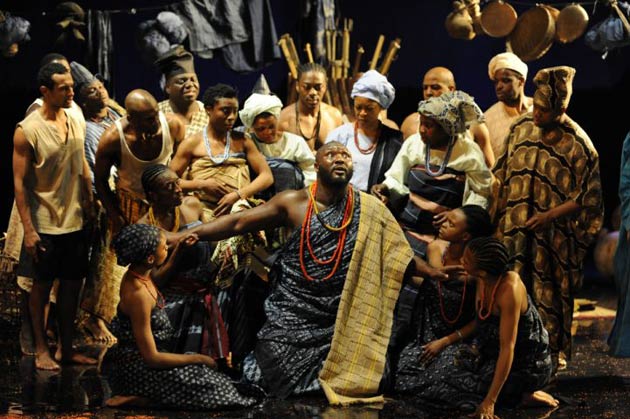Death and the King's Horseman, NT Olivier, London<br/>The Fever, Royal Court Downstairs, London<br/>The Winter's Tale, RSC Courtyard, Stratford
A vivid production of Wole Soyinka's Nigerian comedy-turned-tragedy suggests its director may one day run the house

Your support helps us to tell the story
From reproductive rights to climate change to Big Tech, The Independent is on the ground when the story is developing. Whether it's investigating the financials of Elon Musk's pro-Trump PAC or producing our latest documentary, 'The A Word', which shines a light on the American women fighting for reproductive rights, we know how important it is to parse out the facts from the messaging.
At such a critical moment in US history, we need reporters on the ground. Your donation allows us to keep sending journalists to speak to both sides of the story.
The Independent is trusted by Americans across the entire political spectrum. And unlike many other quality news outlets, we choose not to lock Americans out of our reporting and analysis with paywalls. We believe quality journalism should be available to everyone, paid for by those who can afford it.
Your support makes all the difference.The King is dead. Long live his Horseman. No, that's not how it goes. According to traditional Yoruba culture, when the local ruler dies, his chief horseman is honour-bound to breathe his last as well – to accompany his master to the ancestors' spirit realm.
Pilkings is having none of this, however. In Death and the King's Horseman – Wole Soyinka's comedy-going-on-tragedy, penned in 1975 and based on real events in 1940s Nigeria – Pilkings is a crassly insensitive British colonial officer who scorns Yoruba beliefs. He halts the horseman Elesin's ritual suicide, not foreseeing that this man's English-educated son Olunde will defend that desecrated rite to the hilt.
The satire can still generate a frisson. Black actors, whited up, play the toffs as braying idiots. And Rufus Norris's spectacularly beautiful staging is bursting with life, with vibrant tribal dancing choreographed by Javier de Frutos. Garbed in crimson robes, Nonso Anozie's Elesin is a pampered colossus, a massive beef joint of a man. Also a comic prankster with the ebullience of a puppy, he dashes round the marketplace pursuing shrieking girls. He's a morally ambiguous figure, really wanting to cling on to life.
It's not always easy to follow the story – especially when poetic riddles are relished – and the sombre, hushed last act doesn't become as moving as it might. But, all in all, Norris's inspired and superbly fluid production makes you wonder if he'll run the NT one day.
The well-to-do American in The Fever isn't quite at death's door. She's slumped over a Third World hotel toilet, on a guilt trip, being sick. The wary among you may be relieved to know that this monologue by the US experimental writer Wallace Shawn features no actual projectile spew.
Clare Higgins – in jeans and a crisp white shirt – appears to have simply wandered into a spare rehearsal room. She pulls up a plastic chair and addresses us: "I'm travelling, and I wake up suddenly in the silence before dawn ... shaking and shivering."
Higgins is a great actress. With her husky voice and hooded ice-blue eyes, she enthrals while barely moving a muscle. There's no actual physical shivering, just a quiet intensity in the telling and sharp rhythmic pacing.
To start with, Shawn's fragmented portrait is intriguing too. It leaps between vivid descriptive close-ups of a bug scuttling across the bathroom tiles; visions of a torture cell; and this woman's back story – her blinkered life of privilege and belated obsession with the world's poor.
Kicking off a season of Shawn's plays, Dominic Cooke's revival shows this 1990 piece is still capable of giving the spectator's conscience a few sharp jabs. Unfortunately, though, the evening becomes more like a didactic lecture by a New York socialite having a breakdown. I felt increasingly bored as Higgins's character harped on about the ethical worries that had, seemingly, only just occurred to her, such as the distribution of wealth being unjust. Perhaps our smuggest top bankers will find such aperçus revelatory.
In Shakespeare's The Winter's Tale, King Leontes's febrile jealousy reduces his royal house to ashes. Unjustly condemned for adultery, his wife Hermione apparently dies from grief. So does his son. And his newborn daughter Perdita is abandoned in an icy wilderness.
At first glance, Greg Hicks's Leontes looks highly civilised in this staging by the RSC's new associate director, David Farr. His palace walls are lined with books while he dines elegantly with his old friend, King Polixenes of Bohemia.
Yet aggression lurks and Hicks twitches with insecurity as Kelly Hunter's Hermione acts playfully flirtatious, to persuade Darrell D'Silva's Polixenes to stay longer. Thereafter his escalating paranoia is riveting. The realisation that he has ruined everything is accompanied by an earthquake which transforms his library shelves into the jagged cliffs of the Bohemian coast, where Perdita is deposited and whence she will return. The final reunion, when Hermione's statue comes to life, is poignantly fragile.
The disappointment is that, in between, bucolic Bohemia is an awful drag with lumbering clowning and half-hearted folk dancing. Hit and miss.
'Death and the King's Horseman' (020-7452 3000) to 17 Jun; 'The Fever' (020-7565 5000) to 2 May; 'The Winter's Tale' (0844 800 1110) to 3 Oct
Join our commenting forum
Join thought-provoking conversations, follow other Independent readers and see their replies
Comments